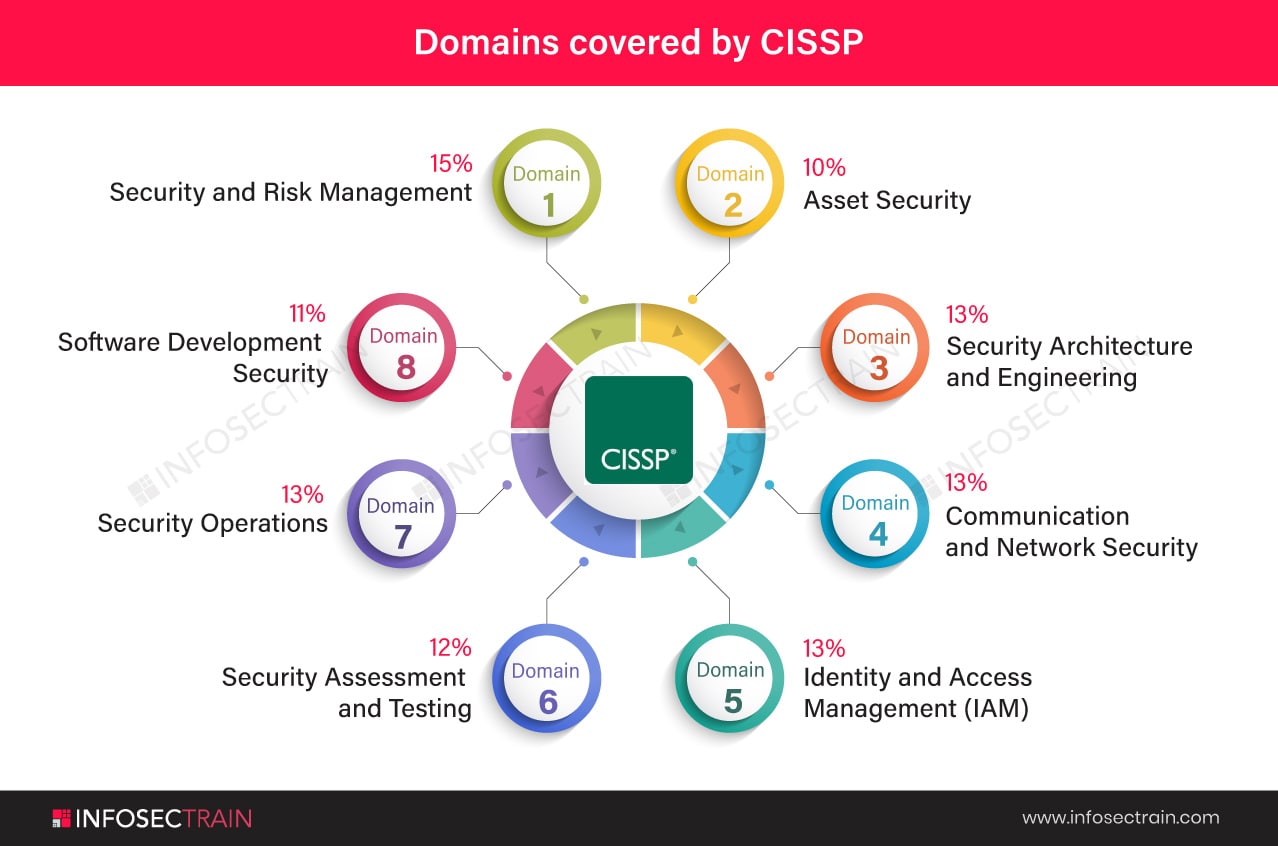A Comprehensive Guide to CISSP Certification (2021)
In today’s globally connected world, the threat of cybercrime is on the rise. The only way to combat cybercrime is to have a sufficient number of cybersecurity professionals. Organizations need these experts to help protect their sensitive data and systems from malicious hackers, defend an ever-expanding security perimeter, and comply with strict data security and regulatory privacy obligations. Qualifications like CISSP help recognize these cybersecurity experts.

CISSP Certification
Certified Information Systems Security Professional (CISSP) certification, offered by (ISC)2, is the gold standard in security certifications and an internationally recognized benchmark for information security professionals. From security and risk management to communication and network security to security testing and operations, the CISSP covers all of the aspects of the cybersecurity field.
Why CISSP certification?
A CISSP certification can help people advance their careers in a variety of ways. Cybersecurity has emerged as a hot job market in recent years. It is easier to get a cybersecurity job if you have CISSP certification. CISSP holders may also receive higher average pay.
CISSP Domains
The CISSP certification exam assesses a candidate’s skills in eight security domains. The eight domains are:

Domain 1: Security and Risk Management (15%)
This domain will cover general security concepts, principles, policies, standards, and guidelines pertaining to information security. It will also discuss the concepts of risk management, threat modeling, SCRM, and more.
Domain 2: Asset Security (10%)
This domain will teach you about data acquisition, storage, maintenance, retention, and destruction. It is a significant domain.
Domain 3: Security Architecture and Engineering (13%)
In this domain, you will learn about important security engineering topics. It will discuss the fundamental concepts of security models, security capabilities of Information Systems (IS), assessing and mitigating the vulnerabilities of security architecture and design, and cryptographic solutions.
Domain 4: Communication and Network Security (13%)
In this domain, you will get knowledge on how to implement and assess secure communication channels and networks.
Domain 5: Identity and Access Management (IAM) (13%)
This domain will discuss how to define and manage individual network users’ roles and access privileges in the company and the conditions under which such rights are granted or refused.
Domain 6: Security Assessment and Testing (12%)
This domain will teach you to apply techniques and tools to identify system vulnerabilities, weaknesses, and potential areas of concern that security processes and policies do not cover.
Domain 7: Security Operations (13%)
In this domain, you will learn the fundamentals of investigations, application of foundational security operation concepts, implement recovery strategy, vulnerability management, and related concepts.
Domain 8: Software Development Security (11%)
This domain will cover how to integrate security in the software development lifecycle. It will also discuss how to identify and implement software-based security protocols in environments where an IT professional is in charge.
CISSP Exam Information
| Exam Name | CISSP CAT | CISSP Linear |
| Exam Duration | 3 hours | 6 hours |
| Number of items | 100-150 | 250 |
| Exam Format | Multiple-choice and advanced innovative items | Multiple-choice and advanced innovative items |
| Passing Score | 700 out of 1000 points | 700 out of 1000 points |
| Language | English | French, German, Brazilian Portuguese, Spanish-Modern, Japanese, Simplified Chinese, Korean |
| Testing Center | (ISC)2 Authorized PPC and PVTC Select Pearson VUE Testing Centers | (ISC)2 Authorized PPC and PVTC Select Pearson VUE Testing Centers |
CISSP Requirements
Candidates for the CISSP certification exam must have at least five years of paid work experience in two of the CISSP CBK’s eight domains. One year of the required experience can be satisfied if you hold a four-year college degree or regional equivalent or an additional certificate from the (ISC)2 recognized list.
The candidate who does not have the necessary experience to become a CISSP can still become an Associate of (ISC)2 on passing the CISSP test. After that, the Associate of (ISC)2 will have six years to complete the five years of experience required.
Get endorsed
After passing the exam, you can begin the online endorsement procedure. This procedure verifies that your claims about professional expertise are accurate and that you are in good standing in the cybersecurity business.
Accept the (ISC)2 Code of Ethics
All (ISC)2 certified information security professionals understand that certification is a privilege that must be achieved and maintained. All (ISC)2 members must pledge to fully support the initiative of the Code of Ethics.
Who is the CISSP for?
The CISSP is perfect for experienced security practitioners, managers, and executives who want to demonstrate their understanding of a wide range of security techniques and principles, such as professionals who work in the following roles:
- Chief Information Security Officer
- Chief Information Officer
- Security Manager
- Security Auditor
- Director of Security
- IT Director/Manager
- Security Systems Engineer
- Security Analyst
- Security Architect
- Security Consultant
- Network Architect
How to Prepare for CISSP Certification?
The CISSP certification is among the most sought-after and challenging in the information security sector. There are no shortcuts to passing the CISSP exam. To prepare for the CISSP certification exam, you’ll need a solid approach and several resources. Here are a few tips on preparing for the CISSP certification exam and passing it on the first try.
Know your exam: Knowing what the exam is all about is crucial in preparing for the CISSP certification exam. The official (ISC)2 CISSP certification page consists of all the information you need to know about the exam, including prerequisites, target audience, exam objectives, exam format, skills accessed, exam fees, and other relevant information.
Create a study plan: To prepare for the CISSP certification exam, you should have a good study plan ahead of time because there are a lot of security concepts and theories to study for.
Study resources: There are a plethora of resources available to help you prepare for the CISSP certification exam, ranging from books, study guides, videos, whitepapers, and more.
Training that’s best-suited for you: Find and enroll in a training option that best meets your needs, fits your schedule and learning style to help you get ready for the rigorous CISSP certification exam.
Tips for the exam day:
- Maintain a calm demeanor throughout the exam
- Eat healthily
- Before taking the exam, make sure you get plenty of rest
- Arrive early at the exam center
- Keep yourself hydrated
CISSP with InfosecTrain
InfosecTrain is one of the leading providers of professional IT security training. Enroll in our CISSP certification training to prepare for the renowned credential from the best trainers in the industry.





 1800-843-7890 (IN)
1800-843-7890 (IN) sales@infosectrain.com
sales@infosectrain.com
 1800-843-7890 (India)
1800-843-7890 (India) 
